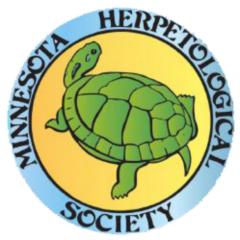Frequently Asked Questions
Wild Animals
Q: I found an injured native reptile/amphibian. How can I rehabilitate it?
A: Please contact a local rehabilitation center. Please be aware that it is illegal to rehabilitate wildlife in Minnesota without a DNR permit.
Q: Can you help me identify this reptile/amphibian?
A: Possibly. If the animal was spotted in Minnesota, you may also check MNHerps.com for photos and information about Minnesota’s amphibians and reptiles.
Q. I found a reptile/amphibian outside during very cold weather. Will it be okay?
A. The Minnesota Herpetological Society recommends leaving any native reptiles or amphibians where you found them whenever possible, even in cold weather. Many reptiles and amphibians can tolerate temperatures in the 40s, and some are even active into the 30s. If the animal has been identified as non-native, they can be brought indoors and allowed to acclimate to room temperature. Under no circumstances should a chilled reptile or amphibian be exposed to a heating lamp or heating pad– rapidly heating a reptile or amphibian may result in shock and even death of the animal.
Q. I found a reptile/amphibian inside my house. What should I do?
A. You should have the animal identified. If it ends up being a native amphibian or reptile, and if the temperature is above 40 F, it’s best to release it outside in your yard. Please do not move the animal to a local park, as amphibians and reptiles have defined home territories. If it is a non-native species, please contact the MHS Adoption Program.
Q: I spotted a reptile/amphibian in the wild. Where can I report this?
A: There are several organizations that track this, including HerpMapper and H.E.R.P. The Minnesota Herpetological Society recommends that specific locations never be shared publicly (e.g. Facebook) as many animals are sought after by poachers, even in Minnesota.
Pet Animals
Q: I want to buy or adopt a reptile/amphibian. How do I take care of it?
A: The Minnesota Herpetological Society recommends thoroughly researching any animal before bringing it home. We have provided a series of basic Care Pages for common pet reptiles and amphibians to help get you started. If you have additional questions, we may reach out to a volunteer mentor to contact you.
Q: My pet reptile/amphibian appears to be sick or injured. What should I do?
A: The Minnesota Herpetological Society is not qualified to issue medical advice regarding sick or injured animals. We recommend contacting a veterinarian as soon as possible. The MHS maintains a list of local veterinary clinics that treat exotics.
Q: I can no longer care for my reptile/amphibian. Can I give it to the Society?
A: The Minnesota Herpetological Society does not maintain a central collection of animals or a central facility. All animals used in MHS programs are privately owned. The MHS does run an Adoption program to place animals in need of new homes with private owners from our membership. Intake events for these animals are scheduled regularly, however, because our Adoption program relies on private fostering spaces, please contact adoptions@mnherpsoc.org in advance if you intend to surrender an animal.
Q: How do I adopt a reptile/amphibian through the Minnesota Herpetological Society?
A: Current members can apply to adopt available animals at our general meetings. There is no associated fee, though donations are permitted.
Q: Can I foster an animal for the Minnesota Herpetological Society?
A: Members are eligible to foster animals that have not yet been adopted. There is a required annual form and foster placements are made at the discretion of the committee. If you are interested in fostering, please contact adoptions@mnherpsoc.org.
Membership
Q: How do I become a member of the Minnesota Herpetological Society?
A: You may join the Society online or at any MHS general meeting. For $30 you can purchase a Basic or Family membership (two adults and minor children) for 12 calendar months.
Q: I am not a member of the Minnesota Herpetological Society. Can I still attend meetings?
A: Yes. Our general meetings are open to the public.
Q. What does a basic membership include
A. Among other things, members in good standing are eligible to order rodents through the Society, to adopt animals at meetings, to participate in our volunteer Foster program, to volunteer on our annual Field Survey, and to volunteer at educational Hands-on Events Including Como Cottage at the Minnesota Renaissance Festival. Members also get a monthly newsletter sent to their e-mail address on file.
Q. Can I become a member if I am under 18?
A. Yes. Minors of any age are eligible to join the society under a basic household membership. Some membership benefits will require the consent and/or presence of a guardian. Members under 10 are not eligible to vote.
Q. When is the next meeting?
A. Check the Events Calendar on the main page.
Donations
Q: I have enclosures or reptile/amphibian products I no longer need. Can I donate these to the Society?
A: New or gently-used items in good condition may be donated at the beginning of a General Meeting. All donated items should be clean and unbroken. Tanks larger than 20 gallons must be cleared in advance.
Q: Can my business make a donation of goods to the Minnesota Herpetological Society?
A: Yes. The Minnesota Herpetological Society hosts an annual fundraising auction and may accept donations of products for this purpose. If you are interested in making a donation, please contact WSS@mnherpsoc.org.
Q: Are my donations tax-deductible?
A: Yes. The Minnesota Herpetological Society is a 501(c)3 tax-exempt organization.
Updated 3/8/2020
